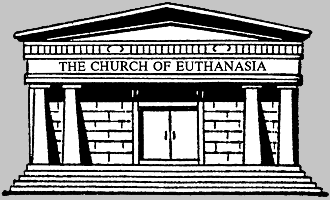
|
| Church of Euthanasia |
The One Commandment: "Thou shalt not procreate" The Four Pillars: suicide · abortion cannibalism · sodomy |
|
SAVE THE PLANET KILL YOURSELF |
|
news ·
resources ·
e-sermons ·
snuff it ·
family album music · video · catalog · faq · press · links · contact |
Church of EuthanasiaChris Korda grew up in New York in a relatively well-off family in post-Vietnam America. A troubled teenager, he fled his parents' home at the age of 15, tired of being stuck between a mother "who thought she was a hippie" and a father in a three-piece suit who wanted to make his child a model American, a young, dynamic executive. Fate would decide otherwise. The teenager who lived on the streets escaped the fate of the homeless who ended up high on crack thanks to his attraction to music. "Like a lot of kids in New York, I would bang on everything I could find with sticks, it calmed me down. I was arrested several times at that time but I still managed to finish my college education." At 17, Chris bought himself a guitar and listened to Jethro Tull, Led Zeppelin and Deep Purple. He already thought that real life was elsewhere. A few years later, while walking in Times Square, he noticed that Flower Power was giving way to a much less optimistic version of life, the appearance of punk. Chris felt concerned by this muted protest, this dark and extremist vibration a thousand miles from the naive idealism of the previous decade. "Strangely, less than ten years later - in 1981 - I completely lost touch with pop culture. I started studying engineering and trying to become a real jazz musician. I was obsessed with the idea of becoming an authentic musician until the day I understood that I had to stop forcing destiny's hand. My artistic career then took a completely different turn." To escape a New York environment that stifles him, Chris flees to Provincetown, a town known for its gay community where he will discover his true identity. During a Halloween party, he dresses completely as a woman and understands from then on that his well-being comes through a strong expression of his femininity. Chris becomes Chrissy, goes out to clubs, listens to dance music, both Madonna and the beginnings of house. The discovery of this music goes hand in hand with the advent of his double identity, Chrissy gets involved in various fairly extremist underground groups before finding his own way. "I played in noise groups, sometimes psychedelic, but I always kept my own demons in mind with a certain number of soundscapes (editor's note) that could not take their current form." In 1992, during a retreat in the dunes of Provincetown, Chris had a vision: he would henceforth be Reverend Chris Korda, apostle of the "Church of Euthanasia" (www.churchofeuthanasia.org), a church unlike any other where the notion of pleasure replaces that of suffering and where it is said that today's man must disappear so as not to drag the organic life of the planet towards an inevitable end. An extremist of social ecology in the same way as Joseph Beuys, an apostle of personal, sexual and individual freedom, Chris Korda chases away one by one the demons of today's America: social and sexual inequalities, hyper-technology, the will to dominate via capitalist power by opposing a society without a future which, failing to be able to perpetuate itself, can only worsen the current situation of man on the planet. Chrissy never stops harassing the media to preach her gospel: "We must use propaganda as much as possible, that's why I organize demonstrations, that I regularly go on television shows like the Jerry Springer show. It's by being hyper-present in the media that I can make myself heard, the second solution consists of broadcasting my music and my installations in art festivals or experimental underground cinema." Chris Korda's career in electronic music started by accident at Popkom in Cologne in 1997. The artist plugged his guitar and microphone into an amp at the Apollo, a local club where DJ Hell was passing through. The producer of International Deejay Gigolo, impressed by his performance, decided to sign Chrissy after a live performance that, in his own words, "sounded like Neil Young on acid". At that time, DJ culture was quite far from Chris's world, as he was just discovering dance music, a milieu in which he found himself immersed as if by accident. Chris continues to make pieces influenced by the electro wave with a textual omnipresence that makes them extremely significant. In his key titles, we find the key words of his theory: Sex is good, Save the Planet -Kill yourself or even Victim of leisure, consumer of amusement that he made known thanks to the compilation of the club Ego. Now an internationally listed artist, the ex-engineer bought himself a home studio where he composes his visionary songs and should soon release a book. Eva-marie Pinon The preceding is a translation. The original language is here. |